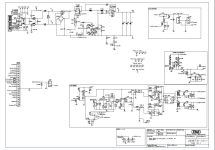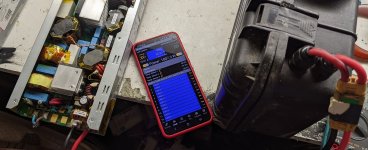It is possible to re-program Eaton so you can have lower voltage and lower amps, this is perfect if you have 14s battery with Adaptto system. Or you want to bulk charge to your preferrable voltage during a simple bulk charge.
First you need to get a 2USD USBasp USBISP 3.3V / 5V AVR Programmer, I used this one:
View attachment 3
Then drill out all pop rivets and open the case:
View attachment 191774
Then using pin out diagram to solder on the wires:
View attachment 191773
After that, download the software (
Eaton Software.zip), you will need:
-usbasp driver
-Khazama AVR programmer(software that extracts the original EEPROM file from the Eaton and writes back your modified)
-Eaton patch tool(with this one you modify settings in your EEPROM file, like voltage and amps)
Install driver and solder on the wires, connect USB programmer to eaton and plug in programmer to your computer. DO NOT plug in you Eaton to wall socket!
If done correctly you will see two Eaton LEDs lit up(one will flash):
View attachment 191776
Once Windows recognize USB Programmer, open up Khazama AVR programmer.
Choose ATMEGA32 in AVR scroll down window. You can test communication by choosing "Command" -> Read Chip Signature
Now you need to read your current EEPROM from Eaton. Command->Read EEPROM to buffer
Then you need to save it to a file. File->Save EEPROM buffer As... Save it to something like DefaultEaton.hex
Start Eaton patch tool, Eaton.exe
Open your saved hex file
You will see current values. Change to what suits you and press Patch
Open up Khazama and load you patched file. File->Load EEPROM file to Buffer
Now write the file to Eaton. Command->Write EPROM buffer to Chip
During write LEDs will turn of on the Eaton.
Then you will get Write OK in Khazama
View attachment 191777
View attachment 191778
Good luck!






